Featured
Dr. Marvin Dunn knows Florida. He was born and has lived most of his life in that state. For this book, he reached deep into the dark well of Florida black history and wrote a compelling and realistic novel based upon a true story about a mixed-race family’s effort to survive during the most racist and dangerous era of Florida history. He not only tells the gripping story in delicious, masterful form but also peers ahead at the future of race relations in America and how reparations can possibly be made a reality.
Dunn brings forth the beauty and flaws of his Florida as only a native could do. His lyrical quickly paced narrative brings to life the characters and the unspoiled Florida environment in which they lived. One almost tastes the salty air, smells the flora in bloom and hears the seabirds overhead. His own life experiences during Florida’s Jim Crow period gives Dunn the capacity to feel and react to the pain of his characters and to appreciate the joy in the few triumphs in their lives. Must Read
Political / Social
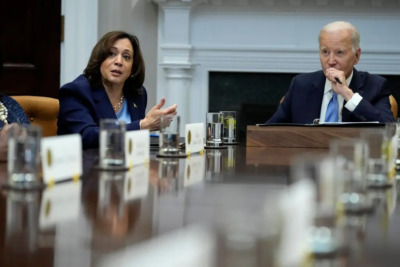 In Search of Kamala Harris. By Astead W. Herndon / NYT
In Search of Kamala Harris. By Astead W. Herndon / NYT
After nearly three years, the vice president is still struggling to make the case for herself — and feels she shouldn’t have to.
In 2017, when Harris arrived in Washington as a senator from California, these contrasts were supposed to make her the Next Face of the Party, the rising star with an inside track to be the next Democratic presidential nominee. But after a disappointing 2020 campaign, and the reputational sting that has lasted ever since, Harris has often been a politician in search of a moment, rather than a leader defining this one. Read more
Related: The Kamala Harris Problem. By Elaina Plott Calabro / The Atlantic
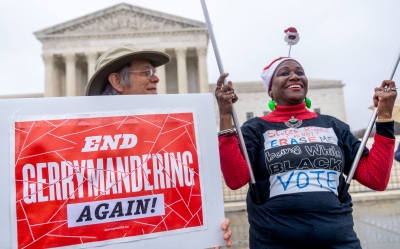 Supreme Court to consider South Carolina GOP’s ‘bleaching’ of Black voters out of Rep. Nancy Mace’s district. By Ariane de Vogue / CNN
Supreme Court to consider South Carolina GOP’s ‘bleaching’ of Black voters out of Rep. Nancy Mace’s district. By Ariane de Vogue / CNN
The Supreme Court’s conservatives expressed doubt at oral arguments Wednesday that South Carolina GOP lawmakers engaged in impermissible racial gerrymandering when they redrew congressional lines for a House seat to benefit Republicans. Image by NPR
The South Carolina State Conference of the NAACP and a Black voter named Taiwan Scott say the use of race dominated the decision-making process and that the state worked to intentionally dilute the power of Black voters. A federal court agreed, referring to the revised map as “bleaching.” Read more
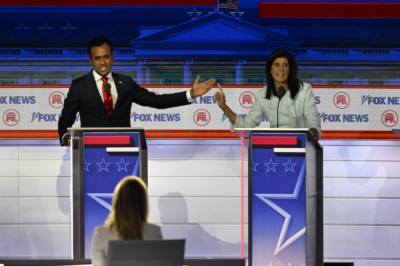 Haley and Ramaswamy get buzz, but little support among Indian Americans. By Sabrina Rodriquez / Wash Post
Haley and Ramaswamy get buzz, but little support among Indian Americans. By Sabrina Rodriquez / Wash Post
But while the pair have generated plenty of conversation, and for some even a little pride, their candidacies haven’t generated widespread support among Indian Americans, the vast majority of whom are Democrats.“It doesn’t matter their background. They do not represent Indian Americans or South Asians, period,” Bhaskar, 64, who calls herself a democracy activist, said as she talked politics with about a dozen friends and acquaintances last month at a café in a strip mall. Read more
Related: How Vivek Ramaswamy turned his elite education into a degree in devil’s advocacy. By , and
 Today’s Republican Party Follows a Familiar Fascist Model. By Joe Mayall / The Progressive
Today’s Republican Party Follows a Familiar Fascist Model. By Joe Mayall / The Progressive
Fascism has many forms and definitions, but the current GOP shares a dangerous number of traits with fascist organizations of the past.
While there are many reasons mainstream media sources shy away from using the term “fascism” to describe the GOP, one reason is that it is difficult to define. Lacking a concrete definition, the label is often thrown around as a generic insult against any politician whose views do not match one’s own. But despite the term’s ambiguity, there are patterns of rhetoric and political strategies that most scholars view as typical of a fascist regime. Perhaps most succinctly, Italian novelist Umberto Eco boiled these traits down to a set of fourteen points in his essay “Ur-Fascism.” Read more
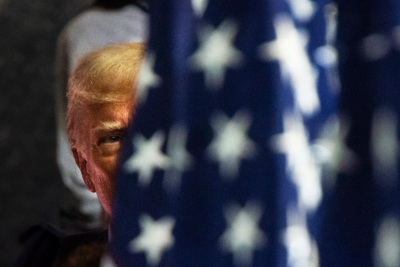 “Project 2025 shows us that the old Right has left the building”: GOP’s surrender to Trump complete. By Chauncey Devega / Salon
“Project 2025 shows us that the old Right has left the building”: GOP’s surrender to Trump complete. By Chauncey Devega / Salon
Power expert explains how MAGA is “consciously manipulated” by “a fear and loathing of liberals”
Donald Trump has publicly announced his plans to become America’s first de facto dictator if he wins the 2024 election. Using Orwellian Newspeak and other lies, Trump and his spokespeople are presenting their fascist agenda as “taking back the country” for “real Americans.” In reality, Trump’s Agenda 47 and Project 2025 (both created by right-wing think tanks and interest groups) are no such thing. If imposed on the American people, these political projects will attempt to end the First Amendment, make White Christianity the official religion, fire government employees who are not personally loyal to Trump, use the military to occupy cities, invoke the Alien Enemies Act to deport undocumented immigrants, and take away the civil and human rights of other targeted groups. Read more
 Social Media Shows Divided State of Black Ameicans on Hamas’ Attack on Israel. By Sherelle Burt / Black Enterprise
Social Media Shows Divided State of Black Ameicans on Hamas’ Attack on Israel. By Sherelle Burt / Black Enterprise
The conversation surrounding the United States’ support of Israel has caused a rift between Black Americans on social media.
Hashtags like #BlackLivesMatter and #PLM—for Palestinian Lives Matter —have highlighted the struggles between Palestinians and African Americans in the fight against systemic racism. However, some users have repeatedly pointed out that Israel didn’t support Black struggles. Read more
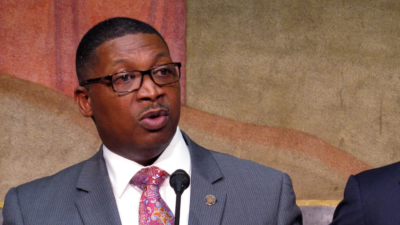 Democrats see warning signs with Black voters in Louisiana governor’s race. By Caroline Vakil and Cheyanne M. Daniels / The Hill
Democrats see warning signs with Black voters in Louisiana governor’s race. By Caroline Vakil and Cheyanne M. Daniels / The Hill
Louisiana gubernatorial candidate Shawn Wilson (D) is facing a challenging path to election amid warning signs that Democrats are not doing enough to motivate their base, including Black voters.
More than a dozen candidates are running to replace term-limited Gov. John Bel Edwards (D), with six main contenders emerging from the pack. Louisiana uses an open primary system where all contenders are listed under one ballot; if no candidate receives more than half of the vote, the two top vote-getters head to a runoff. Read more
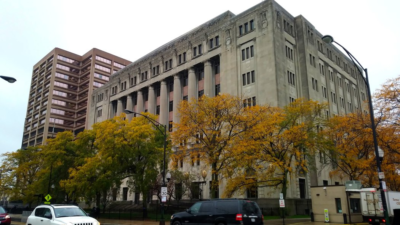 Cash Bail Ends in Illinois, How Will Things Change? By Michael A. Brant / The Progressive
Cash Bail Ends in Illinois, How Will Things Change? By Michael A. Brant / The Progressive
The Pretrial Fairness Act makes Illinois the first state in the country to end the system of cash bail. Now systems and attitudes must adjust.
llinois is now the first state to completely end cash bail. On September 18, the Pretrial Fairness Act went into effect across Illinois, drastically changing the way the state treats crime and incarceration in courtrooms, jails, and police stations. Read more
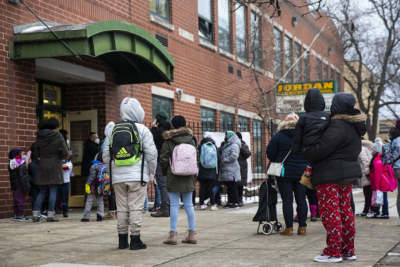 School choice and race: How the debate affects parents and communities. By Ken Makin / CSM
School choice and race: How the debate affects parents and communities. By Ken Makin / CSM
Public or private? Our columnist argues that rather than getting caught up in the school choice debate, what parents really want is the best education for their children.
When we pit public schools versus private schools and other alternative education options, the reality is that separate is not equal, and further, separation as it relates to education in this country has always meant unequal. The beginning of unity is a mutual understanding that we should provide opportunities for families whose ambitions may not fit what their neighborhood school has to offer, but we should similarly ensure that such options come about after exploring and emphasizing the richness of our public schools. Read more
Ethics / Morality / Religion
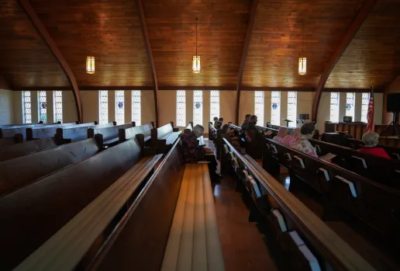 The nonreligious are a growing US phenomenon. They really don’t like organized religion. By Peter Smith / NCR
The nonreligious are a growing US phenomenon. They really don’t like organized religion. By Peter Smith / NCR
The decadeslong rise of the nones — a diverse, hard-to-summarize group — is one of the most talked about phenomena in U.S. religion. They are reshaping America’s religious landscape as we know it.
In U.S. religion today, “the most important story without a shadow of a doubt is the unbelievable rise in the share of Americans who are nonreligious,” said Ryan Burge, a political science professor at Eastern Illinois University and author of The Nones, a book on the phenomenon. Read more
When you hear the term “Jewish,” do you think of the religion or the ethnic group? While many people confuse “Jewish” in religion with “Jewish” in ethnic identity, this episode will help clarify whether this term refers to an ethnicity, religion, or some combination of the two. Watch here
 DC AME Church Files $22 Million Lawsuit Against The Proud Boys: ‘We Will Not Shrink In The Face Of This.’ By Tomas Kassahun / Blavity
DC AME Church Files $22 Million Lawsuit Against The Proud Boys: ‘We Will Not Shrink In The Face Of This.’ By Tomas Kassahun / Blavity
Lamar said the case is not just about a vandalised banner.
“It’s more than doing violence to a sign — they seek to continue the violence their ancestors visited upon our ancestors,” Lamar said on a conference call with congregants in 2020. “They don’t want to just ruin signs. They want to destroy lives. They want to destroy hope. They want to erase history. We won’t let them do that.” Read more
Historical / Cultural
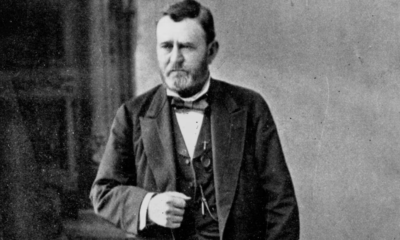 Klan War: how Ulysses S Grant took the fight to the extreme right. By Rich Tenorio / The Guardian
Klan War: how Ulysses S Grant took the fight to the extreme right. By Rich Tenorio / The Guardian
Historian Fergus Bordewich salutes the civil war general turned 18th president for his attempt to reconstruct the south
Beginning in Ulysses S Grant’s first term, the civil-war general turned president focused his energies on a new campaign. Although this one also involved the army, it primarily relied on the forces of the American legal system to combat a rising threat in the south – the racist violence of a new clandestine organization, the Ku Klux Klan. To a large extent, Grant prevailed, as chronicled in a new book, Klan War: Ulysses S Grant and the Battle to Save Reconstruction, by the historian Fergus Bordewich. Read more
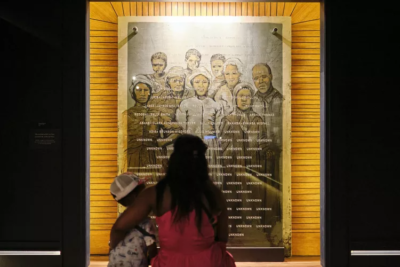 The Last U.S. Slave Ship Arrived in Alabama 163 Years Ago — This New Museum Honors the 110 People on Board. By Natalie Preddie / Travel and Leisure
The Last U.S. Slave Ship Arrived in Alabama 163 Years Ago — This New Museum Honors the 110 People on Board. By Natalie Preddie / Travel and Leisure
The Clotilda, the last known U.S. slave ship, arrived in Mobile, Alabama, in 1860 with 110 enslaved people. Travel journalist Natalie Preddie visits and reports on the opening of “Clotilda: The Exhibition” at the Africatown Heritage House.
The legend of The Clotilda, the last-known U.S. slave ship, shaped Africatown long before “Clotilda: The Exhibition” opened in Mobile, Alabama’s Africatown Heritage House this past summer. From Zora Neale Hurston’s “Barracoon: The Story of The Last Black Cargo,” which is the biography of a Clotilda survivor, to Bob Marley’s song “Buffalo Soldier,” lore of the last 110 African slaves on board has haunted Mobile, Alabama, since the ship’s arrival 163 years ago. Read more
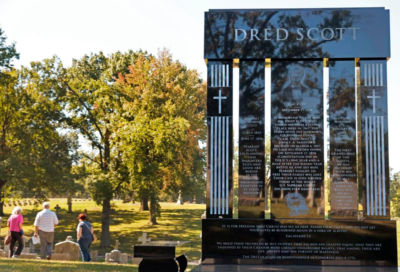 Dred Scott’s struggle for freedom honored with new memorial. By Gabrielle Hays and Solveig Rennan / PBS
Dred Scott’s struggle for freedom honored with new memorial. By Gabrielle Hays and Solveig Rennan / PBS
The name Dred Scott is synonymous with the struggle for freedom. Now, 165 years after the Supreme Court case that bears his name, Scott’s gravesite is a memorial befitting that legacy. NewsHour Communities Correspondent Gabrielle Hays reports. Read more and listen here
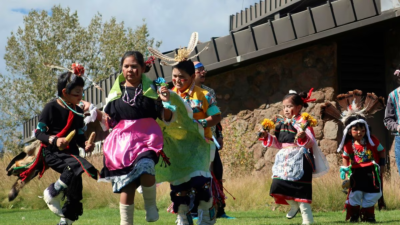 Native Americans celebrate their histories and cultures on Indigenous Peoples Day. By Mark Theissen and Morgan Lee / ABC News
Native Americans celebrate their histories and cultures on Indigenous Peoples Day. By Mark Theissen and Morgan Lee / ABC News
Native Americans are celebrating their histories and cultures with events across the country marking Indigenous Peoples Day
Events across the country — including a sunrise gathering in Minneapolis, a statehouse rally in Maine, a celebratory march in Seattle and traditional dancing, music, and food in Alaska and Arizona — marked celebrations of Indigenous Peoples Day. The ceremonies, speeches and performances in traditional regalia Monday came two years after President Joe Biden officially commemorated the day honoring “America’s first inhabitants and the Tribal Nations that continue to thrive today.” Read more
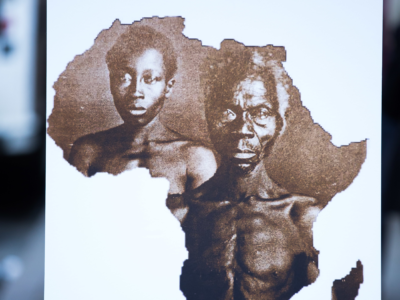 A Racist Harvard Scientist Commissioned Photos of Enslaved People. One Possible Descendant Wants to Reclaim Their Story. By Jennifer Berry Hawes / Propublica
A Racist Harvard Scientist Commissioned Photos of Enslaved People. One Possible Descendant Wants to Reclaim Their Story. By Jennifer Berry Hawes / Propublica
The images are among the oldest known photographs of enslaved people in America. Tamara Lanier’s fight to gain control of them shows there is no clear system in place to repatriate remains of captive Africans or objects associated with them.
The woman turned her car onto the campus of Harvard University, a place she had never been, and parked near a museum renowned for its invaluable cultural artifacts. But on that day in 2010, Tamara Lanier did not come to see ancient Mayan murals or African masks. She arrived to view historic photographs of enslaved people she had recently come to believe were her own ancestors. Read more
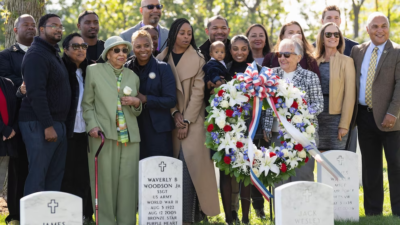 Black medic wounded on D-Day to be honored for treating dozens of troops. By Rebecca Santana and Kevin Wolf/ ABC News
Black medic wounded on D-Day to be honored for treating dozens of troops. By Rebecca Santana and Kevin Wolf/ ABC News
An African American combat medic, Cpl. Waverly B. Woodson Jr. who was wounded while landing on Omaha Beach during the D-Day invasion of France but went on to tend to dozens of troops has been posthumously honored. Read more
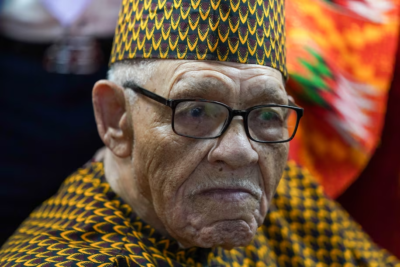 Hughes Van Ellis, one of the last known survivors of the Tulsa Race Massacre, dies. By DeNeen L. Brown / Wash Post
Hughes Van Ellis, one of the last known survivors of the Tulsa Race Massacre, dies. By DeNeen L. Brown / Wash Post
Hughes Van Ellis, 102, gathers with family, friends and local and African officials for a citizenship ceremony at the Embassy of Ghana in Washington on Feb. 28. He died in Denver on Monday. (Jahi Chikwendiu/The Washington Post)
Hughes Van Ellis, one of the last three known survivors of the 1921 Tulsa Race Massacre, died Oct. 9 at a veterans’ facility in Denver, according to his family members. He was 102. The cause of death was cancer. Read more
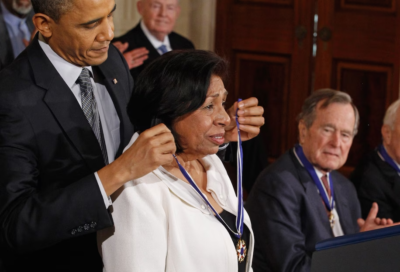 How an 8-year-old Hispanic girl paved the way for desegregation. By Gillian Brockell / Wash Post
How an 8-year-old Hispanic girl paved the way for desegregation. By Gillian Brockell / Wash Post
President Barack Obama presents human rights activist Sylvia Mendez with the 2010 Medal of Freedom in the White House on Feb. 15, 2011. (Chip Somodevilla/Getty Images)
Gonzalo Mendez’s testimony in a California courtroom was brief, but within it were layers of American history — of segregation, incarceration and inequality. It was also the straightforward testimony of a dad who loved his daughter. It was a Tuesday morning in the summer of 1945, and Mendez was explaining to a judge how, the previous fall, he had tried to enroll 8-year-old Sylvia and her little brothers in an Orange County public school near their home in Westminster, Ca. They were denied because they were Hispanic, he said. Read more
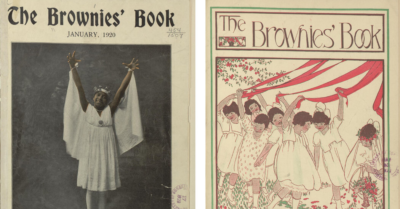 The First Magazine for Black Children Is Revisited, Its Message Still Resonant. By Celia McGee / NYT
The First Magazine for Black Children Is Revisited, Its Message Still Resonant. By Celia McGee / NYT
An anthology that combines new work with selections from The Brownies’ Book, a children’s magazine launched by W.E.B. Du Bois, is bringing its mission to bear in a new national context.
The first magazine created especially for Black children, The Brownies’ Book, debuted in January 1920, its pages filled with the voices of children and their parents, of poets and college coeds, biographers and advice columnists, schoolgirls and scholars, spinners of fables and gatherers of folk tales, and a panoply of Black figures staking a claim in the history of a country that would rather not acknowledge them. Read more
Sports
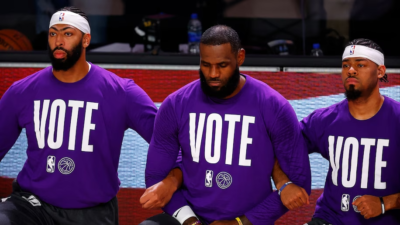 Athletes’ advocacy for voting rights garners broad support, poll finds. By Sapna Bansil and Emily Guskin / Wash Post
Athletes’ advocacy for voting rights garners broad support, poll finds. By Sapna Bansil and Emily Guskin / Wash Post
While Americans are divided on whether athletes should speak out on behalf of social and political causes, a clear majority support them advocating for voting rights, according to a Washington Post-University of Maryland poll.
As athletes have continued to bring attention to a range of issues — including systemic racism, gender inequity, gun violence and LGBTQ+ rights — the poll finds that 51 percent of Americans favor athletes expressing their views on social and political issues. Meanwhile, support for athletes leading efforts to promote voting rights is considerably higher: Almost 7 in 10 — 69 percent — approve, a number that is virtually unchanged since 2021. Read more
 The 1948 baseball photo with a radical message of acceptance. By Frederic J. Frommer / Wash Post
The 1948 baseball photo with a radical message of acceptance. By Frederic J. Frommer / Wash Post
Steve Gromek and Larry Doby embrace after Game 4 of the 1948 World Series. (Bettmann Archive)
Like Jackie Robinson before him, Larry Doby — the first Black player in baseball’s American League — endured racist taunts from fans and opposing players, discrimination in hotels and restaurants and even hostility from his teammates. For Doby, a World Series embrace with a White teammate was an antidote to that torrent of abuse. Read more
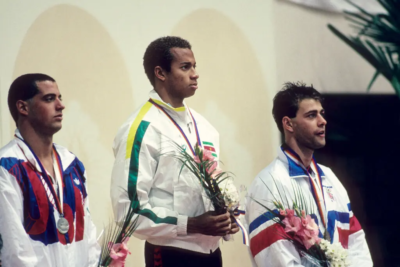 No Longer Just ‘Goggles and a Suit’: Anthony Nesty on How Swimming Has Changed. By Victor Mather / NYT
No Longer Just ‘Goggles and a Suit’: Anthony Nesty on How Swimming Has Changed. By Victor Mather / NYT
At the 1988 Seoul Games, Anthony Nesty, middle, became the first Black swimmer to win an Olympic gold medal. He was recently named the coach for the U.S. men’s team for the Paris Games in 2024
The first Black head coach of a U.S. Olympic swimming team talks to us about diversity in the sport and coaching in the Instagram era. Read more
Site Information
Articles appearing in the Digest are archived on our home page. And at the top of this page register your email to receive notification of new editions of Race Inquiry Digest.
Click here for earlier Digests. The site is searchable by name or topic. See “search” at the top of this page.
About Race Inquiry and Race Inquiry Digest. The Digest is published on Mondays and Thursdays.
Use the customized buttons below to share the Digest in an email, or post to your Facebook, Linkedin or Twitter accounts.
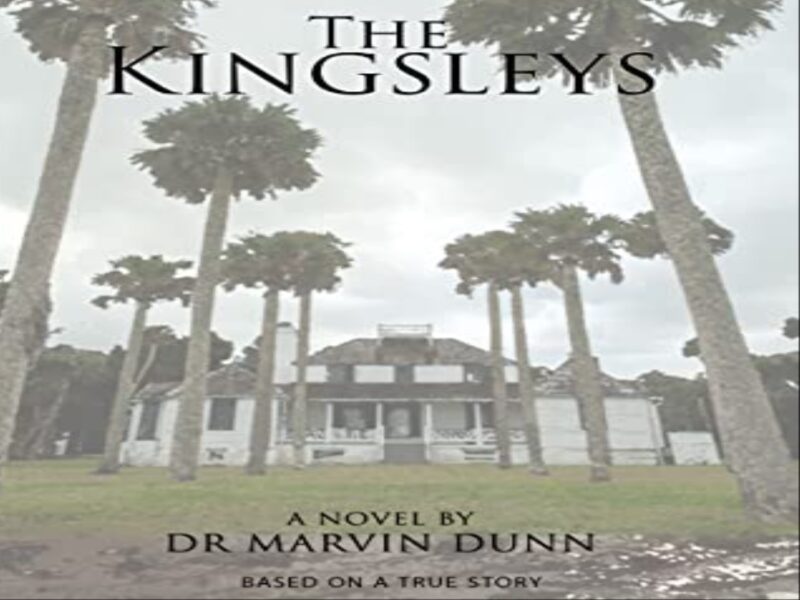 The Kingsleys. A Novel By Dr. Marvin Dunn / Amazon
The Kingsleys. A Novel By Dr. Marvin Dunn / Amazon Is “Jewish” a Race or Religion? By Patheos
Is “Jewish” a Race or Religion? By Patheos